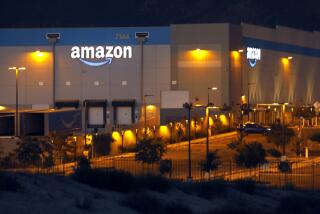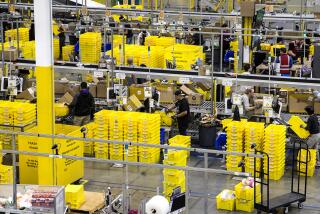Amazon’s brutal workplace is an indicator of an inhumane economy
Is Amazon just a grueling 21st century sweatshop or the model for tomorrow’s high-powered workplace? And is there any difference between the two?
The New York Times has sparked a national discussion about Amazon with a report detailing what it is like to work in the Seattle corporate offices of the behemoth online retailer. As at many new economy enterprises, Amazon workers put in long hours -- about double the 40-hour workweek that was once standard in the American workplace. Vacations are few. Most often the rare holiday escape merely provides a nice place to work remotely. Everyone is tethered to their cellphones so they can be reached by bosses at all hours of the day. There is a constant push to perform and produce.
See the most-read stories this hour >>
If such pressures are common in high-tech workplaces, at Amazon they have been cranked up to an extreme level. Current and former Amazon employees interviewed for the article spoke of colleagues weeping at their desks. They described the demand for frequent self-criticism and the anonymous criticisms directed at fellow workers seeking to drag them down in the eyes of managers. By design, Amazon sets impossibly high goals while monitoring and measuring every aspect of an individual’s productivity. Those who thrive in the environment are rewarded with stocks rising in value. Those many more who burn out leave after a few years of having been compensated with only what used to be a typical middle-class salary. Those who resist sacrificing their personal lives for their work are even more quickly discarded.
Ex-Amazonians told of being pressured by supervisors to spend less time with their families. One woman was expected to get back to work the day after her miscarriage. Others were penalized for taking time to care for ailing parents or for expecting to be given slack while they dealt with major diseases. Responding to the story, Amazon founder and ruling guru Jeff Bezos said those excesses were not his intention and that any such “shockingly callous management practices” should be reported directly to him.
“Even if it’s rare or isolated, our tolerance for any such lack of empathy needs to be zero,” Bezos said in a letter to employees.
Of course, Bezos is not the first corporate leader to make extreme demands on his underlings, only to be nonplussed when some of them try to fulfill his wishes by abusing other employees. Like “Casablanca’s” Captain Renault expressing shock at finding gambling in a casino, the top executives always feign surprise when their managers take things too far.
Arguably, if Bezos wants to run his company this way, he is free to do it, and anyone who does not want to work in Amazon’s pressure-cooker atmosphere can go somewhere else. What is disturbing, though, is that Amazon is just the leading edge of a widespread phenomenon: a rapid shift away from treating workers as full human beings with lives apart from their labor and toward a work world where even smart, loyal employees are interchangeable and expendable cogs in an endlessly grinding machine.
In that kind of unrelenting work environment, what happens to the people who want to spend time with their children -- or even have children in the first place? What happens to those who do not thrive under constant demands for output but who have valuable talents and skills that can blossom in more humane and relaxed workplaces? Where do the people go that may not be the smartest and the fastest and the most competitive? Are they to be sloughed off to the margins of the economy?
What, ultimately, is the point of all this high-intensity labor, 16 hours a day most days of the year? If it is to make men such as Bezos extremely rich, it has done that, but what is in it for the workers who devote their lives to his vision for two or three years and then wearily stumble away from the company? Have they built something important and soul-enriching? Or did they just shave some minutes off the time it takes to fill the shopping carts of impatient, lazy consumers?
Shouldn’t there be a little more to life than that?
MORE ON AMAZON:
Amazon sparks tech workplace debate
Jeff Bezos says he won’t tolerate a ‘callous’ Amazon workplace
Is Amazon a grueling, hostile place to work? N.Y. Times says yes, Jeff Bezos says no
More to Read
A cure for the common opinion
Get thought-provoking perspectives with our weekly newsletter.
You may occasionally receive promotional content from the Los Angeles Times.







